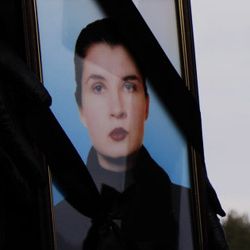The report about problems of HR defenders and their activities in the UN member-states was prepared by the Special Rapporteur Margaret Sekaggya. The document contains not only detailed information about the HR activities in each country but also included official responses of countries’ authorities. In a way the report represents a comprehensive approach in covering the whole spectrum of HR activities. It summarises cases of HR violations transmitted to mamber-states governments and replies received.
In the Belarusian section the report underlines several problematic moments related to HR activities in the country.
Procedural errors and disposition to paranoia
First, the UN HR Council Special Rapporteur notes the situation around HR Centre Naša Viasna (formerly known as Viasna/Spring). It has encountered numerous obstacles with the official registration set by the authorities. Viasna cannot have its status legalised. At the same time the Belarusian Criminal Code contains the infamous Article 193.1, which punishes for activities of unregistered organisations.
 On 12 August 2009, the Supreme Court of the Republic of Belarus rejected an appeal of Naša Viasna, confirming the decision by the Ministry of Justice of 25 May 2009, not to register the organization. During the trial before the Supreme Court, which commenced on 10 August 2009, the Ministry of Justice reportedly criticized minor details in Naša Viasna’s registration application and accused members of including distorted information in the application. In response to this, members of Naša Viasna argued that what the Ministry referred to as distorted information concerning the identities of the founding members were clerical errors. Also, the legal validity of a letter of guarantee for the organization’s future premises was reportedly called into question by the Ministry of Justice. Representatives for Naša Viasna highlighted that the Ministry of Justice had not objected to the same letter in previous registration attempts. Despite the fact that the reasons given for non-registration of Naša Viasna are not listed among those in Article 15 of the Law of the Republic of Belarus on Public Associations which stipulates the grounds on which registration of a public association can be denied, the Supreme Court Judge, Mr. Anatol Tserakh, subsequently agreed with the decision of the Ministry of Justice confirming the denial of registration for Naša Viasna. The human rights organization was reportedly also denied the possibility of correcting its application so that it might comply with the requirements of the Ministry of Justice, in contradiction with Article 15 of the Law of the Republic of Belarus on Public Associations which allows for such corrections.
On 12 August 2009, the Supreme Court of the Republic of Belarus rejected an appeal of Naša Viasna, confirming the decision by the Ministry of Justice of 25 May 2009, not to register the organization. During the trial before the Supreme Court, which commenced on 10 August 2009, the Ministry of Justice reportedly criticized minor details in Naša Viasna’s registration application and accused members of including distorted information in the application. In response to this, members of Naša Viasna argued that what the Ministry referred to as distorted information concerning the identities of the founding members were clerical errors. Also, the legal validity of a letter of guarantee for the organization’s future premises was reportedly called into question by the Ministry of Justice. Representatives for Naša Viasna highlighted that the Ministry of Justice had not objected to the same letter in previous registration attempts. Despite the fact that the reasons given for non-registration of Naša Viasna are not listed among those in Article 15 of the Law of the Republic of Belarus on Public Associations which stipulates the grounds on which registration of a public association can be denied, the Supreme Court Judge, Mr. Anatol Tserakh, subsequently agreed with the decision of the Ministry of Justice confirming the denial of registration for Naša Viasna. The human rights organization was reportedly also denied the possibility of correcting its application so that it might comply with the requirements of the Ministry of Justice, in contradiction with Article 15 of the Law of the Republic of Belarus on Public Associations which allows for such corrections.
Considering that participating in the activities of an unregistered organization is a crime in Belarus under Article 193.1 of the criminal code, members of Naša Viasna now risk being arrested if they continue their work in defence of human rights. Nevertheless, HR defenders from Naša Viasna have declared their ever strong intentions to continue their defence work even under treats of possible arrests.
 The report does not leave without attention the ill-famed case of Yana Palyakova, the HR defender who commited suicide on 6 March 2009. Educated as a lawyer Yana Paliakova was an activist of the unregistered Legal Public Assistance organisation. She was also cooperating with other HR organisations.
The report does not leave without attention the ill-famed case of Yana Palyakova, the HR defender who commited suicide on 6 March 2009. Educated as a lawyer Yana Paliakova was an activist of the unregistered Legal Public Assistance organisation. She was also cooperating with other HR organisations.
Last March the Salihorsk district court found Paliakova (on photo) guilty of slander, Article 400.2 of the Criminal Court. She was charged with defaming a police officer and was sentenced to two years of a personal freedom restriction. Moreover, she had to pay a fine, as a moral compensation to the policeman.
She pleaded not guilty and claimed that the police officer had beaten her.
On the eve of Yana’s death, the biggest official newspaper Sovietskaja Biełorussija ran a satirical article featuring Belarusian human rights defenders including Yana Paliakova. According to her friends this publication was the last straw that pushed Yana towards her end.
The official version insists that all Palyakova’s claims about persecution and harassments have been properly investigated and that several of her claims were not substantiated.
HR defender-chauvinist
As a quintessential case of HR defender harassments the report presents the situation around Leanid Svetsik from Viciebsk, who, in fact, is one of the Naša Viasna co-founders.
 A court hearing against Mr Leanid Svetsik commenced on 10 June 2009, in the Viciebsk regional court presided by Judge Mrs. Halina Urbanovich. Mr Svetsik was first named as a witness in a case involving threats against certain individuals from the extreme-right organization Russian National Unity. Mr. Svetsik was later declared a suspect in the same case and is now charged under article 130, section 1, of the Criminal Code (Incitement of racial, ethnic or religious enmity or discord). A second charge of libel against the President of Belarus under article 367 of the Criminal Code was dropped as unsubstantiated.
A court hearing against Mr Leanid Svetsik commenced on 10 June 2009, in the Viciebsk regional court presided by Judge Mrs. Halina Urbanovich. Mr Svetsik was first named as a witness in a case involving threats against certain individuals from the extreme-right organization Russian National Unity. Mr. Svetsik was later declared a suspect in the same case and is now charged under article 130, section 1, of the Criminal Code (Incitement of racial, ethnic or religious enmity or discord). A second charge of libel against the President of Belarus under article 367 of the Criminal Code was dropped as unsubstantiated.
In the period between 2006 and 2007, Mr. Svetsik was rendering legal aid to Viciebsk citizens, who received letters with threats on behalf of the extreme-right organization Russian National Unity, and was helping to prepare complaints to prosecutors. Concern was expressed that the charges laid against Mr. Svetsik may be related to his activities carried out in the defence of human rights. Concern was also expressed that Mr Svetsik might be not afforded a fair trial.
On 16 July 2009, the criminal division of the Viciebsk Provincial Court sentenced Mr. Svetsik under article 130, paragraph 1, of the Criminal Code to pay a fine of 31,500,000 Belarusian roubles (approximately US$ 11,130).
The court found Mr. Svetsik guilty of engaging, from July 2006 to January 2008, in premeditated acts aimed at provoking ethnic enmity and discord among the Belarusian, Jewish and Russian ethnic groups, advocating the exclusivity and supremacy of the Russian ethnic group, and demeaning the national honour and dignity of the Belarusian and other ethnic groups. Coming to Viciebsk for this purpose, he posted pamphlets on behalf of an unregistered organization, Russian National Unity (Viciebsk branch), to the Viciebsk Provincial Executive Committee, newspapers, Belarusian theatres, and members of political parties and voluntary associations. The pamphlets contained pictures, statements and slogans aimed at provoking ethnic and religious enmity and discord among the Belarusian, Jewish and Russian ethnic groups, advocating the exclusivity and supremacy of the Russian ethnic group and the Orthodox religion, and demeaning the national honour and dignity of the Belarusian, Jewish and other ethnic groups.
In addition, the conclusions of expert handwriting analysis indicated that the addresses on the envelopes containing the pamphlets had been written by Mr. Svetsik. Forensic analysis established that the pictures and printed text of the pamphlets were produced on a printer using the supplementary toner cartridge and paper that were seized from Mr. Svetsik’s place of residence. Authorship analysis indicated that the texts of the letters containing the pamphlets sent to the injured parties and witnesses had all been written by the same person.
According to the expert academic analysis conducted by the linguistic commission, the Russian National Unity pamphlets under investigation may contain explicit incitement to interethnic enmity and discord aimed at demeaning the national honour and dignity of the Belarusian, Jewish and other ethnic groups.
After the sentence the HR defender publicly denied his guilt, calling any accusation against him fabricated and absurd. He also confessed that the fine imposed on him was ‘impossible to pay.’
Summing up details of all cases, the UN Council on Human Rights defines the working conditions of defenders in Belarus as ‘limited and restricted,’ calling upon the authorities to create proper conditions which will foster the development of the HR defence.
Documents:


